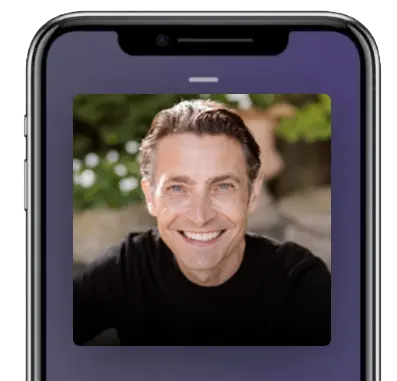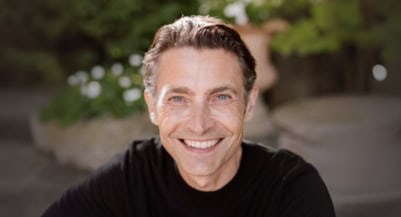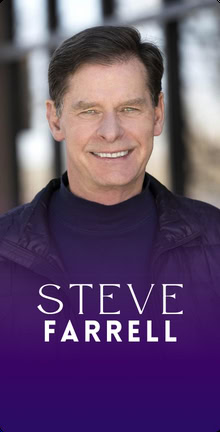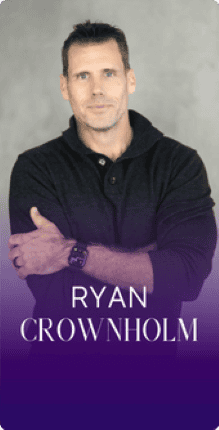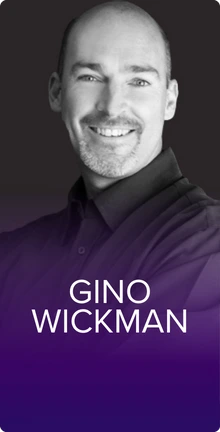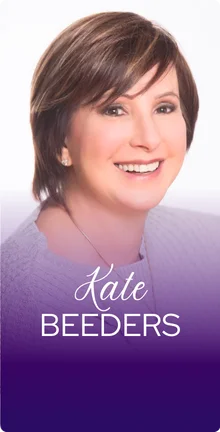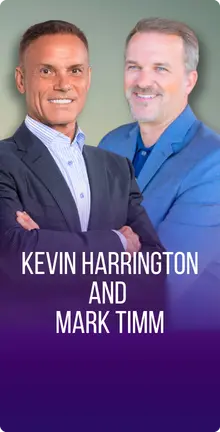In this Episode
- [02:35]Learn about the serendipitous connection between Rob Dube and Gino Wickman, revealing a backstory filled with synchronicity and shared philosophies.
- [05:00]Uncover the inspiration behind the title Shine for Rob and Gino’s latest book and how a powerful phrase from 20 years ago shaped Rob’s outlook on life and business.
- [09:09]Stephan shares a dramatic episode with a client that challenged his business acumen and led to an unexpected yet highly beneficial outcome, underscoring the importance of faith and divine setups in business decisions.
- [14:56]Deep dive into shadow work as Rob explains how uncovering hidden aspects of oneself can redefine business and personal growth.
- [24:34]Contemplate the concept of the most benevolent outcome, challenging traditional business logic and opening up new pathways for decision-making.
- [33:04]Rob and Stephan explore common mental constructs that drive entrepreneurs to exhaustion, offering insights into breaking free from these patterns.
- [36:01]Discover how outer success often mirrors inner challenges and what steps driven individuals can take to align their lives and work harmoniously.
- [38:10]Overview of The 10 Disciplines essential for reclaiming time and mental clarity, providing a structured path for sustained business and personal success.
- [43:19]Rob highlights additional resources for listeners wanting to get more insights from him.
Rob, it’s so great to have you on the show.
Stephan, thank you for having me. I greatly appreciate it, and I look forward to chatting with you.
Yeah, me too. We know each other through Genius Network, and Joe Polish has been a guest on this podcast—an amazing human. We have some shared friends and colleagues, and so forth. Speaking of colleagues, your co-author, Gino Wickman, has been a guest on the show. He’s an amazing guy, and really glad we’ll be talking about your new book with him, just the whole set of principles you guys have developed and all the interesting collaborations that have come about from you and Gino working together.
Let’s start with a bit of an origin story. I’d love to hear how you and Gino ended up connecting. Was there some sort of synchronistic magic that brought you two together?
I love that you ask it that way. You’re the perfect person to ask that. I know this about you. You see things. I’ll start quickly with part of my journey. Growing up at 14, I became an entrepreneur. I started selling Blow Pops lollipops out of my locker with my best friend. The two of us had all kinds of businesses through high school and college. After graduating college, we started a company called imageOne, which is still around.
We actually sold it and bought it back during our journey. We are still the principals and owners of the company, but someone runs it for us. So we sit in the owner’s box on the board of directors. As you mentioned in the bio, I’m running a company called The 10 Disciplines, and my business partner is Gino Wickman. Talk about synchronicity, we were one of Gino Wickman’s first clients when he was creating the EOS Process—the entrepreneurial operating system—wasn’t even called that at the time. He was experimenting on his first seven clients, as he likes to say.
At the time, I thought he was coming in to help us take control of our business, which certainly was part of it. But truth be told, as I look back, we were brought together for a much greater purpose. That is what leads us here today—you and me together—this book Shine that Gino and I collaborated on and co-wrote with the goal of helping entrepreneurs free their true selves.
How did that name come about in the book title? One interesting trivia that I learned pretty recently was from BJ Fogg. He came up with the word “shine” as a name for an emotion that he said had previously, to this point, not been named. It’s the feeling of success or progress. He is trying to get more shine in the world by getting people to institute tiny habits, feeling that shine, and then building upon those habits with even more involved habits, but starting really tiny and making sure that that habit formation sticks because of that feeling of shine. I don’t know if you’ve ever heard this before.
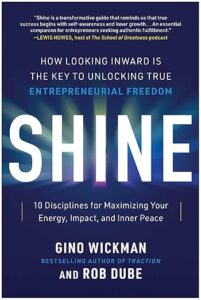
No, I haven’t. It’s very interesting, though. Funny story: we were looking at different titles, and our book publisher and our agent had other ideas in mind for the title, and they were more probably in alignment with what might be good for marketing. Not that that was a bad idea. Those were good ideas; we leaned in that direction, but something didn’t feel right. When we talk about your true self, freeing your true self, being your true self, it’s just the word we use.
It wasn’t aligned with either one of us. One day, Gino connected with me, and he said, “What do you think about the word shine?” I immediately said, “I love the word shine,” because about 20 years ago, I was working with somebody on freeing my true self, and her name was Michelle. She said, “Rob, it’s time to let your light shine,” that always stuck with me. When he said “shine,” that’s all he needed to say.
I said, “That is our title, Gino. We have to do this.” He agreed, and the publisher and agents went with it. But what you shared with us about that is interesting. Thank you.
Yeah, BJ is amazing. I don’t know if you’ve ever met him, but he’s been involved with Genius Network for a while.
I look forward to meeting with him.
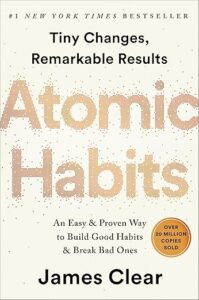
He has incredible principles and processes for positive habit formation and then breaking negative habits or habits that don’t serve you. He’s got a course at Stanford that he’s been teaching for a long time, and his students have included the founders of Instagram. And, of course, his claim to fame is all this habit formation research and everything. Yet his book has sold a small fraction in comparison to his book competitor, Atomic Habits.
I’m sure you sold hundreds and hundreds of times more copies. In some sense, it feels unfair because he’s the originator. On the other hand, it also feels karmic to me. I don’t know. I get the sense that it’s exactly the way it’s meant to be, and this is a divine setup and a lesson for all the parties involved.
There you go. I think to build on what you’re saying, can we go through our lives with that type of mindset and have a knowingness that whatever the reason this is unfolding, it’s here for some reason? I embrace that reason versus just trying to push it away or trying to make it different than what it is. Because, to your point, there’s truly a lesson in all of it. When you allow that to be miraculous, use your word, and miraculous things can happen.
Speaking of miracles—we’ll get back to your origin story. I didn’t forget about that. This wild thing happened late last year with a problematic client, let’s just say, and it wasn’t due to the CEO. It was due to one of the people who reported to one of his reports. I got guidance to actually fire the client. I was reticent to do so because we lost two really big accounts, not for performance reasons, but because of financial reasons.
It takes faith and patience to build something meaningful, especially in the world of entrepreneurship. Share on XThey both had to lay off multiple staff, not just vendors. We weren’t the only vendor that was let go. It was not a smart time, from a pure logic perspective, to fire a client, especially our biggest one at the time. It took a lot of courage, but I did it. An amazing thing happened within minutes. The CEO replied and said that he wanted to see what he could do to work this out so that instead of us parting ways that we could rectify the situation, we ended up getting a large budget increase from the client.
Instead of losing the client, we received a big budget increase. This is relevant to our discussion because there’s this Jewish wisdom that says, “God gives, God takes away, May God’s name be blessed.” When you look at everything as a blessing, including when God takes away, well, in this case, God gave me a great unexpected bonus in the form of a big budget increase. It lasted for seven months. It didn’t last that long, but it certainly made a big difference during that timeframe.

Looking at this from a bigger-picture perspective, it might seem like, “Wow, that’s a shame. It’s too bad that it didn’t last.” It was only seven months of this budget increase. And really, it’s about looking at it from this perspective of everything being a blessing. That, “Why is this in my movie? What’s the benefit of it?” I get the sense that this will make way for a new chapter, a new set of clients that are more of a match or even better vibrational fit. I guess if you look at everything as a divine setup, it takes a lot of the pressure off.
It does require faith and patience, especially in the entrepreneurial world. I love your word, “courage.” What came to me, and it’s because that’s how we write it in the book, is that you were coming from love, but courage is your word. That’s the perfect word. But many entrepreneurs would come from fear. In that scenario, they’d come from lack. And you didn’t do that.
Many entrepreneurs come from fear. In that scenario, they’d come from lack.
That’s a funny thing. Again, from just a pure logic perspective, it was bad business to do what I did because we were already in a cash-burn situation with those two big clients. It was, from an outside kind of pure business perspective, reckless to fire a client, the largest client that we had, without having someone else in the wings.
So the business coach, the hypothetical one, would probably say, “Just suck it up, Stephan. It’s not a great situation with this client, but just do your best to find some new clients, and then you can cancel.” That’s not what I did because I got guidance to go against that logic.
Those types of clients are coming at a low vibrational energy, and that’s sucking your energy, your team’s energy, which blocks the ability for these opportunities to come in, which are the ones that help you do your best work and serve and make a greater impact.
Enjoy life within your boundaries, and bring your best, most focused energy to your craft. Share on XThis person who said, “You need to let your light shine,” what did that mean for you and what ended up occurring because you received that message?
Oh, what a great question. At that point in my life, I never felt like I was doing enough or I was enough. Everywhere I looked, it felt like everybody was more successful in business than I was. I constantly felt like I was running uphill, trying to be what they were, causing me not to be my true self. Now that my true gifts come forward—because I was trying to do the things that I thought were the things that needed to be done to be a successful person and entrepreneur. Michelle helped me see that in a different way. That reframing was very impactful for me. We did a lot of shadow work together, which was a big result.
Can you describe what you did to integrate your shadow? If our listener is unfamiliar with shadow work, you could explain the process and what the shadow is.
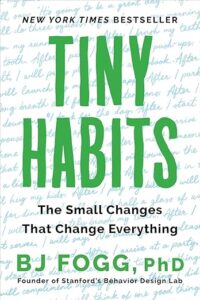
I just noticed the different parts of me that were in the way. It was over 20 years ago, so all the different stuff we did specifically, I can’t even remember. What comes to my mind most is that it was a lot of deep work and felt hard. It felt like I was really working hard. My mind was on overload, which, as I reflect on it now, and having done a lot more work, my mind was really in the way.
I was trying to intellectualize everything, which was part of the process with Michelle, to help me get out of my mind and recognize my true self, my innate self, what my true gifts are, and to allow those to come forth and allow my mind to get out of the way for me to be able to do that. So, how that showed up in business is that I put myself in a position at my company where I initially focused on people in the totality of their lives. I would think about that daily, not just with our team members but with our customers.
For example, let’s say we had a difficult customer, which we have and still do. I would always try to think, “How can I show up and lift them in some way through my energy and interaction with them?” Because they’re having a challenging time in some way and because I know they don’t want to treat humans the way they’re treating them. None of us want to treat each other badly. But sometimes, due to our circumstances and other things beyond what I might have knowledge of or what we might know, they’re struggling, and as a result, they’re showing up in a particular way.
Maybe in some vital way, we can show them through our minor interactions with them that life can look a little bit different. I just tried to think about that all the time when there were challenging situations and certainly closer to home with our team, just realizing that they have a lot of components to their lives, and they’re coming in and trying to do their best every day. What can we do? What can I do to serve their needs better? We as a company couldn’t do certain things, but what could we do to help their experience in the eight hours they were with us be as positive and good as it could be? So, I focused a lot on that during the time that I was running the company.
I try to intellectualize everything to help me get out of my mind and recognize my true gifts.
Do you see aspects of your shadow in this difficult client?
I’m quite sure that I do.
Have you thought about that?
I haven’t, but you’re making me think about it. I like it now. See, I’m removed from it now, so I’m thinking back. For example, I wrote in my book, “Do nothing about a Fortune 100 company that I was involved with.” They were a client, and their culture was very challenging. I could feel the challenge that the people I was working with were dealing with and the sense that maybe this was something they needed to do to make a living, but their real life operated outside their 9 to 5. I felt like, at times, maybe they were imprisoned in a way and didn’t feel like they could get out.
So, to answer your question, maybe those are those I felt at times in my life and felt like I couldn’t get out. Having gotten out, how could I be useful to them? How could I serve them so maybe they could see it differently? So good. I love that question.
If everyone is just a mirror for us.
Totally.

Then again, this is all divine setup. So, totally, someone is doing something to you. It’s actually for you, but you feel violated, frustrated, and angry. It’s triggering you. That’s an invitation to look at your unowned or disowned aspect.
You’re reminding me of this great question you posed. We were going through a period when, because they were a large company, they would issue RFPs (requests for proposals). We were an incumbent, and they put us through this process, which was scary. I felt a lot of fear. The process was long—it took about 18 months—so it felt like 18 months of fear. They were one of our largest clients then or in our top five.
As you shared in your story, it would be a significant impact to lose them for us financially. I’m a regular meditator, so this would come up frequently during my meditations. I could just feel it bubbling up in my mind. Then, I would have the feeling my mind would have, the emotions, and all the different paths that it would go down in fear of what about this and what we would have to do, and just everything that goes with that.
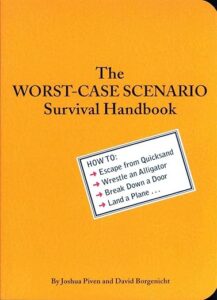
When you’re potentially losing a major client, which was a story I was creating, I used to have to remind myself that this is a big story you’re creating. You’re way in the future, losing the client when there’s no certainty that you’ll lose or keep them or something in between. First of all, what’s the deal with that and trying to shed whatever it is that’s blocking me from seeing things clearly as they are in the present moment, which is simply a request to go out and look at other options to make sure they’re doing the right thing in their business, which makes complete sense and knowing and having the confidence that we’re doing the best that we can. If that isn’t meeting their needs, as you said with your client, that’s what needs to happen. We need to not be together.
You’re reminding me of a Tony Robbins quote. It might originally be from somewhere else, but Tony would say this, and he’d explain that you want to see things as they are but also see them better than they are. Not worse, but better than they are. We’re so good at catastrophizing that our brains just go straight there. What’s that book that’s a big bestseller? The Worst-Case Scenario Survival Handbook. It’s like all the terrible things, like if you get bit by a shark or alligator or you’re falling off of a skyscraper, all these crazy things that could happen but almost certainly won’t and how to survive them. What about The Best-Case Scenario Handbook? Assume the best, not the worst. But no, it’s too easy to go to the worst-case scenario.
Yeah, that’s so true.
You mentioned that you were a regular meditator and meditating on this thing of the shadow, or actually, you were meditating on this thing about potentially losing this client during this 18-month-long RFP process. Do you believe that you helped bring about the best outcome by meditating, or do you believe that by fixating on it, you kept running that through your head over and over and over again, you actually manifested a less-than-ideal outcome? Oh, and the word I was looking for is ruminating.
I learned the lesson of allowing myself to see things more clearly and really coming to the present moment.
Ruminating. Yeah, that’s a better word. It wasn’t with intention. It was just what was coming up. I’m just thinking about this now, as you’re asking me. I think I was shedding. I was learning a great lesson during that period. I’m not really sure I was manifesting. We won the account, and we still retain the business to this day. They’ve been a client for 15 years now. I never thought of it in terms of manifesting an outcome.
If I had manifested any outcome, we probably would have lost it. However, I definitely learned the lesson of allowing myself to see things more clearly and really coming to the present moment. I had been meditating for quite sometime before that, and I believe my meditation practice was very useful during this time. But it was a great reminder because I would always think about the importance of really being in the present moment, dealing with exactly what you have in front of you and not being so concerned about the past or the future. It could be a bit of a karmic test for me.
Do you want to hear something wild? Jan Tober taught me about the most benevolent outcome, which originated from Tom Moore, author of The Gentle Way. I use it all the time—MBO for short. The most benevolent outcome assumes that you don’t know everything, which you don’t. We don’t—none of us do—and we don’t have the full big picture. When I ask for guidance and pray, I pray for the most benevolent outcome.
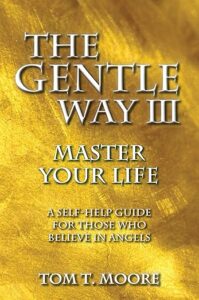
If I’m asking for healing for myself or someone else I care about, if I’m asking for a client to be retained or some sort of relationship to be restored or whatever, it may not actually be for the most benevolent outcome. I bring this up because my intuition tells me it wasn’t the most benevolent outcome you retained to that client through that 18-month-long process. I would love to hear what you have to say about that.
I’ll need more time than our podcast will require. I don’t know.
What an amazing thing to think about and to really start operating. I don’t know what kind of operating system this would be called. It’s not even entrepreneurial. It could be like a heavenly operating system. If you think, “I should let this guy or gal go. Maybe I should let this client, staff, and opportunity go. I should say no to the speaking gig.” Even though it all looks good on paper, it makes total sense from a pure business perspective. But will that bring about the most benevolent outcome? If I’m getting a no, like in my gut or inner knowing.
Here’s something that’s coming to mind. For me, that experience helped me see something more clearly. I went to my business partner and said, “I can’t do this anymore. I can’t experience this kind of pain. I’m not in the place where I need to be; we need to change something.” We made a commitment to make changes, and we did. To make a long story short, I couldn’t be happier since that experience and the changes we made didn’t happen overnight. They took some number of years.
Your greatest asset is time, so get your time back.
But as I mentioned at the outset, I think I did. I can’t remember. I’m not involved with my company anymore. I’m in a different place. There’s somebody who is much more capable, with the drive, the willingness, and all the things needed to grow the company in the way we intended it to grow and serve the people helping it grow. That was a really important experience because it was kind of like a two-by-four to my head.
It’s like change must be made. You are not the person to take this company to where it needs to go. You’re no longer capable, nor do you have the drive. I’m not sure that answers the part about whether it was the right outcome in terms of the company’s relationship with the client, but it certainly felt like a benevolent outcome for me.
Right. Everything is a divine setup. It’s a rigged game where everything is for your highest good.
As we keep down this path, if this isn’t interesting, just stop me. You’re helping me think about these things. When we made the changes, I had more time in my life, one of the things we teach in the book, which is your greatest asset, is to get your time back. When I had time in my life back, I saw things more clearly. I had an interview with Gino Wickman, your guest, my co-author, and my business partner, a bonus section of the audiobook for his last book, The EOS Life.
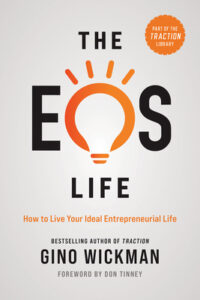
His firm had hired me to do that interview. And so I put a lot of preparation into it, as I always do. We had a great interview. After the interview, we went to lunch, and I asked, “What are you doing with this content? I think it would be amazing to bring this to the world.” That was the beginning of what became the company we started. None of that would have happened had it not been for the experience I shared with you about the client.
It’s all perfect.
This is the work I have always wanted to be doing and was doing within my organization and with our team.
You have the subtitle for your book, “How Looking Inward is the Key to Unlocking True Entrepreneurial Freedom.” How metaphysical or spiritual do you get in this book? Because inward really is where infinity is. That’s not the edge of the universe because there is an edge to the universe.
Gino is masterful at bringing complex ideas and simplifying them. So we say in the book, is this religion? Is this spiritual? Is it metaphysical? Is it common sense? I don’t know. That’s for the reader to decide. We’re not experts in any of that. We’re just sharing our experiences, taking content out there and trying to simplify it for people so they can incorporate it into their lives as simply as possible. For listeners aware of the EOS process, you might imagine you have your business now.
We share our experiences, take content out there and try to simplify it so people can incorporate it into their lives as simply as possible.
All these tried and true ways of running a business get packaged up in a way where you can easily incorporate it into your business and use it as an operating system. And all of a sudden, it all comes together. This is what we did with Shine. But instead of incorporating it in your business, you incorporated the driven person, the driven entrepreneur, into you. We’re writing about how once you can find the time in your life and the space in your mind to go inside, you will change how you operate, not just in your business but outside your business.
You will have more inner peace and make decisions based on love rather than fear. These are many of the things you and I have been talking about through our stories. But that inner journey is critical because we believe you need to go inside and look at all the things in your way. Gino and I experienced—we write about it in the book, and I’m happy to talk about it—we both have experienced some pretty significant traumas in our lives.
But people ask me all the time. I was chatting with somebody the other day, and she said, I don’t feel like I’ve had any major traumas. I had a very happy upbringing. And it isn’t about that. We still have the way the world hits us, and things get in our way because of that. These mental constructs are developed, and they show up in different ways. This person happened to be highly driven, over-the-top driven.

It’s like no time in her life–exhausted, with three kids, a husband, and just no time to think or decompress. That’s all I was sharing; something’s there. You have everything you need in your life: safety, security, and love. Yet something is still driving you to the max, and that’s just worth investigating.
What are some of these mental constructs that driven people have that you help them deconstruct in your book?
There’s an absolute million of them. You can start digging into all the reasons. First of all, why do we become entrepreneurs? Why do we take that path? I’ve thought about that myself to share certain parts of my story. I never felt like I had control in my life, and somehow, I thought by starting my own business, I would gain control and have some level of freedom that I didn’t have before. There’s a mental construct that I had to work through because, truth be told, you don’t have control over your business or anything. By the way, I don’t have to tell you that you don’t really have control of any of it. Does your business really give you freedom? I don’t know. In some ways, some of the entrepreneurs you and I know are not free. They’re handcuffed to their business. Their identity is their business.
I had to work through a mental construct because, truth be told, you don’t have control over your business or anything else.
They work the hardest and work the longest hours of the entire team. They are always on and available, whether in the middle of the night, on the weekend, or during vacation. However, they’re still checking email and worrying about the business, so yeah, that’s not freedom.
And where does that come from? Let’s just say one has a spouse or a family. You’re trying to spend time with them, but your mind is in 10,000 other places. What’s that all about? Why is your mind focused on a problem at business? How come you can’t bring yourself to the present moment and be there for that person? Because they feel your energy. They know you’re there physically. Anybody close to you knows when you’re not present with them.
You could even be engaged in a conversation, and they would know you’re not present. They know your mind’s somewhere else. It’s just a feeling. So what’s up with that? There’s a mental construct there that I encourage one to uncover and really dig deep into.
People feel your energy. Anybody close to you knows when you’re not present with them.
And those people who trigger you or show you a mirror where you need to work on these things, even if you’re not looking at them, will attract that into your life until you own it, integrate it and love that aspect of yourself unconditionally. That’s the shadow work we were talking about earlier. Our outer world is a reflection of our inner world.
That is for sure. As we build our empires, whether we realize it or not, we want the outer world to see our success. “Okay, good. You’re successful. Congratulations.” There are these sayings in Buddhism, and one of them is not to expect applause. I love that one. So you have your successes, and then you have your things. Congratulations. You have your things and a roof over your head—that’s as good a roof as one could have. You also have all the other things you could have imagined that would make you happy, yet you’re still struggling.
The trappings of success are traps.
Exactly. Those are great reflections, for one. Because I’m all for that kind of success. By the way, by all means, enjoy life. If we work hard within a set of boundaries, what we encourage is finding boundaries around it. Bring all the best energy you have, the most focused energy, to whatever it is in your craft or your business. If that means doing it 30 hours a week so you can experience and be present with other things in your life, then use that time really wisely because you are losing time in ways you’re not thinking about.
Whether we realize it or not, as we build our empires, we want the outer world to see our success.
Through our 10 Disciplines, we encourage you to know you’re 100%. Decide and commit to the perfect number of hours where you’ll create the greatest impact within your business, go for it, and grow your business. You will have financial success, which will come from that, and you will enjoy it.
What are those 10 Disciplines? I know we don’t have time to go over all of them, but let’s explain what they are briefly.
Discipline number one is ten-year thinking. That’s just shifting your mind from short-term thinking to thinking in 10-year time frames. The second discipline is taking time off. We recommend taking 130 days off per year and not thinking about working the entire time. So you’re completely off without checking email or checking in with the office—no reading business books, no thinking about work.
Discipline three is to know thyself, and that is to be you 24/7, 365 days. Let your freak flag fly. Don’t be a chameleon. Discipline number four is to be still and sit in silence for 30 minutes—every single day. Discipline number five, which I already mentioned, is to know you’re 100%. Discipline number six is to say no often. Say no to anything that doesn’t fit into those first five disciplines. We have a hard time saying no. We don’t want to miss out. We don’t want to disappoint.
Low-vibrational clients drain your and your team's energy, creating a barrier that prevents greater opportunities from flowing in. Share on XDiscipline number seven is don’t do $25 an hour work or work below your pay grade. Never do anything you could pay someone below your pay grade. That frees up time and space in your mind to build your business, do the things in your life, and be present with the people most important to you. Discipline number eight is prepared every night. Before your head hits the pillow every night, simply document the next day’s plan.
Discipline number nine is to put everything in one place. That is to pick the one place where you will capture every idea, commitment, thought, action item, and promise you make throughout the day. Discipline number 10 is humility. Simply view yourself as an equal to every person on this planet. These 10 disciplines create a foundation for you, helping you regain your greatest asset: time. They also keep your mind clear, allowing you to work inside.
I would actually argue that it makes you more benevolent, too.
The second discipline is taking time off. We recommend taking 130 days off per year and not thinking about working the entire time.
I believe that to be true. I’m right there with you.
Awesome. Thank you for quickly walking us through those 10 disciplines. Was that the output of a collaboration between you and Gino, or was it something you or he channeled or just wrote up one day? How did these come about?
Those were Gino’s way of living his life. When he finally wrote them out, I realized that over the years that I had gotten to know him, I was gleaning these off of him. I wasn’t masterful at them, but I noticed he was doing this and this, and I thought it was so interesting and unique. He ultimately created a keynote around it, which he delivered to the EOS community during COVID-19. This included a very pared-down version, his first version in The EOS Life book. Then, when the two of us collaborated, we built it out and made it more than it was initially.
That’s cool. Is there a discipline that helps prepare somebody for, let’s say, an awakening event, some sort of spiritual epiphany or download? If you quiet your mind and get into the present moment, you get into a place of high vibration and gratitude, and everything is a blessing, including tragedies, traumas, and challenges. You’re much more likely to get a download to get some sort of spiritual insight. You don’t need plant medicine to do it.
Yeah, I don’t believe there’s one. It’s like picking my favorite child. They truly are most powerful together.
So, when you do all 10, does that prepare the person’s soul for a next-level awakening event?
It’s a strong foundation that opens everything up. The first part of our book is about opening it up, so those feeling pinged might check it out.
Never do anything you could pay someone below your pay grade.
Amazing. Well, I know we’re out of time. Where do we send our listeners if they want to get the book, if they will follow you and learn from you even more than just reading the book, or work with you and your company? What’s the next step?
the10disciplines.com. A great starting point is to have an assessment. It’s called the True Self Assessment. It’s 20 questions, and it’ll show you where light needs to shine in your life so you can focus more on those areas.
Awesome. And where are you most active on social media?
LinkedIn.
Rob, it was a pleasure. You’re a light in the world.
You are, too, Stephan. I can’t wait to see you in person.
Yeah, likewise.
I saw you at our last Genius Network meeting, but it was on video because I was on Zoom. You shared your story about going to prison.
Yeah, not as an inmate, but as a guest.
Yes, as a guest. But my heart was warmed when If heard that story.
I was reticent. That was the first time I’d ever stepped foot in a prison, and it was really gratifying and inspiring and perspective. It was shifting for me to be there and to talk to the folks there. It was a women’s prison, and a few of us from Genius Network came and gave talks and helped inspire and uplift the residents who were there listening. And we made a difference. I know we made a difference. It’s not that hard to do it.
Just there’s this mental barrier of, like, “Oh, I can’t even imagine stepping foot into a prison to talk to inmates. Who does that? It’s just so unusual to hear somebody doing that.” And I just thought, “Wow, we need to destigmatize this for folks so that it’s a regular thing that people are like, “Oh yeah, I’m happy to go speak at the local prison.’”
Well, thank you, listener. Thank you for being on this journey with me. We’ll catch you on the next episode. Have a great week. This is Stephan Spencer, your host, signing off.

